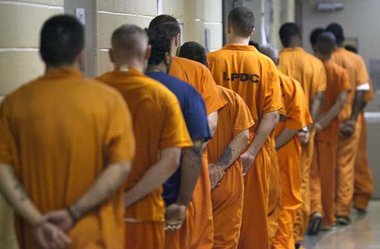Prison deaths up by 46% in 2020
Share
Explore Our Galleries
Breaking News!
Today's news and culture by Black and other reporters in the Black and mainstream media.
Ways to Support ABHM?
Fred Clasen-Kelly, NPR
One reason the U.S. trails other developed countries in life expectancy, experts say, is that it has more people behind bars and keeps them there far longer.

After spending 38 years in the Alabama prison system, one of the most violent and crowded in the nation, Larry Jordan feels lucky to live long enough to regain his freedom.
The decorated Vietnam War veteran had survived prostate cancer and hepatitis C behind bars when a judge granted him early release late last year.
“I never gave up hope,” says Jordan, 74, who lives in Alabama. “I know a lot of people in prison who did.”
At least 6,182 people died in state and federal prisons in 2020, a 46% jump from the previous year, according to data recently released by researchers from the UCLA Law Behind Bars Data Project.
“During the pandemic, a lot of prison sentences became death sentences,” says Wanda Bertram, a spokesperson for the Prison Policy Initiative, a nonprofit that conducts research and data analysis on the criminal justice system.
Now, Jordan worries about his longevity. He struggles with pain in his legs and feet caused by a potentially life-threatening vascular blockage, and research suggests prison accelerates the aging process.
2 million Americans in jail or prison
Life expectancy fell in the United States in 2021 for the second year in a row, according to the Centers for Disease Control and Prevention. That decline is linked to the devastating effect of Covid-19 and a spike in drug overdoses.
Some academic experts and activists say the trend also underscores the lasting health consequences of mass incarceration in a nation with roughly 2 million imprisoned or jailed people, one of the highest rates in the developed world.
A Senate report last year found the U.S. Department of Justice failed to identify more than 900 deaths in prisons and local jails in fiscal year 2021. The report said the DOJ’s poor data collection and reporting undermined transparency and congressional oversight of deaths in custody.
Thousands of people like Jordan are released from prisons and jails every year with conditions such as cancer, heart disease, and infectious diseases they developed while incarcerated. The issue hits hard in Alabama, Louisiana, and other Southeastern states, which have some of the highest incarceration rates in the nation.
Read the rest of the article here.
Learn about the effects of mass incarceration on the African American community here.
Find more Breaking News here.











Comments Are Welcome
Note: We moderate submissions in order to create a space for meaningful dialogue, a space where museum visitors – adults and youth –– can exchange informed, thoughtful, and relevant comments that add value to our exhibits.
Racial slurs, personal attacks, obscenity, profanity, and SHOUTING do not meet the above standard. Such comments are posted in the exhibit Hateful Speech. Commercial promotions, impersonations, and incoherent comments likewise fail to meet our goals, so will not be posted. Submissions longer than 120 words will be shortened.
See our full Comments Policy here.